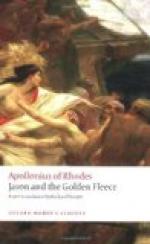Thus he spake; and the youths hearing the divine utterance rejoiced at their return, but grief seized them for the fate of Idmon. Now at the hour when the sun passes his noon-tide halt and the ploughlands are just being shadowed by the rocks, as the sun slopes towards the evening dusk, at that hour all the heroes spread leaves thickly upon the sand and lay down in rows in front of the hoary surf-line; and near them were spread vast stores of viands and sweet wine, which the cupbearers had drawn off in pitchers; afterwards they told tales one to another in turn, such as youths often tell when at the feast and the bowl they take delightful pastime, and insatiable insolence is far away. But here the son of Aeson, all helpless, was brooding over each event in his mind, like one oppressed with thought. And Idas noted him and assailed him with loud voice:
“Son of Aeson, what is this plan thou art turning over in mind. Speak out thy thought in the midst. Does fear come on and master thee, fear, that confounds cowards? Be witness now my impetuous spear, wherewith in wars I win renown beyond all others (nor does Zeus aid me so much as my own spear), that no woe will be fatal, no venture will be unachieved, while Idas follows, even though a god should oppose thee. Such a helpmeet am I that thou bringest from Arene.”
He spake, and holding a brimming goblet in both hands drank off the unmixed sweet wine; and his lips and dark cheeks were drenched with it; and all the heroes clamoured together and Idmon spoke out openly:
“Vain wretch, thou art devising destruction for thyself before the time. Does the pure wine cause thy bold heart to swell in thy breast to thy ruin, and has it set thee on to dishonour the gods? Other words of comfort there are with which a man might encourage his comrade; but thou hast spoken with utter recklessness. Such taunts, the tale goes, did the sons of Aloeus once blurt out against the blessed gods, and thou dost no wise equal them in valour; nevertheless they were both slain by the swift arrows of Leto’s son, mighty though they were.”
Thus he spake, and Aphareian Idas laughed out, loud and long, and eyeing him askance replied with biting words:
“Come now, tell me this by thy prophetic art, whether for me too the gods will bring to pass such doom as thy father promised for the sons of Aloeus. And bethink thee how thou wilt escape from my hands alive, if thou art caught making a prophecy vain as the idle wind.”
Thus in wrath Idas reviled him, and the strife would have gone further had not their comrades and Aeson’s son himself with indignant cry restrained the contending chiefs; and Orpheus lifted his lyre in his left hand and made essay to sing.




